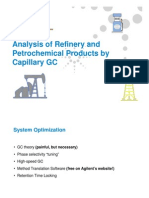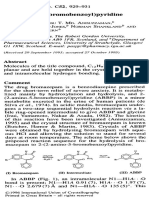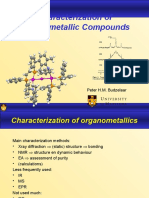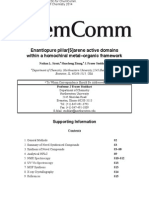0 ratings 0% found this document useful (0 votes) 32 views 2 pages 2024-10-06 16-26
X Bridge certificate of acceptance
Copyright
© © All Rights Reserved
We take content rights seriously. If you suspect this is your content,
claim it here .
Available Formats
Download as PDF or read online on Scribd
Go to previous items Go to next items
Save 2024-10-06 16-26 For Later Certificate of Acceptance
XBridge™ Cj. 5 um
Batch Number 0247
The chromatographic OC test used to eval
documented [7 8]. The mobile phase contain a pH 700
\eproionaied silanols. The tet compounds incude two hycocarbons (2-Methy Nephthal
Phthalate), 2 phencl (Buy! Paraben, and two strong bases: a secondary (2°) anine (Propranolol), and a tertiary (3°) amin (Amitrityine
‘We regrt the result for seven difeet relative retention values, as well as the USP tain factors for De two bases. The table below its
the resus foreach parameter, and graphically shows where each osu (he rectangle) fs wthn the spesticaton range the ne)
The 2-Methyl NaphthalenelAcenaphtene tlatveretenion is a measure of te Hydrophobic Selectivity ofthe mater. T
ParaberiAcenaphinene reave relenton is 3 measure of the Hydrogen-Bond Accoptor Activity of the maleal. The Dip
Phihaae/Acenaphthene relative retention sa measure of the Hydrogen-Bond Donor Activity ofthe material. The Buy ParabenDipropy
Phindate relative retenten is a measue of the Hydrogen-Bond AcceptortDonor Selectivity. The PrepraclaliAcenaphthene relative
telefon is @ measure of he 2° Amine Silanol Activity. The Amitipyine!Acenaphwene elatvecelenion s a maasue ofthe 3° Amine
Slanol Activity. The Poprancle/Amitipyie relative reertion sa measure othe 2°3° Amine Selectivity
To measure the Metal Chelating Activity, we use a tst reported by Engelhart and Lober, which employs a mate o
pyridy! (6). Only the 2.2isomer can form chelation complexes wth suriaoe metal impurities, suchas ton. Packing materials with high
surface metal concentrations may cause excessive taling of tho 2- isomer. The rato of he asymmetis (As) of the peaks fem these two
species ameasue oftha meal celating actly
fe the batch of bonded parteles contained in ye
+, tentonaly chosen to accentuate the interacton of protonated bates
‘and Acenaphinene), an ester (Drop!
and 4
— Sa es racrreree
o] ‘Dewpoint
0.08 | | ‘Mobile Phase: 55/45 (viv) MeQH/Butfer
“=| | Terpotre 976
TO a Column: 4,6x150 mm
feat Ratron a ae
2Metyterconaiee re aan ar saranl
Davparteabeoptere 1? Wamacoparicy
eeeeeeaiee era steno ias
pauenemeees es sinicocael
em So scarey
erometonaree aR sere sey
rrceahatie om 7 kam Gaay
meat case a —
ppc US? Tae aaa {2s dn Say
22 Dnt Dy fat po cacaan i
(measured as separate test)
WKFexm S068. APape 22
Quit Approved Sonal Chavan Date:�ridge
COLUMNS
romatogran
bud
ators X
Hyd patio
patles, the organic component the 1,2bissiloxyathan
bonded to attach the dsiod functonaly, then end
ficate of Acceptance
XBridge™ Cy, 5 um
Batch h
ich Numb
Acceptance "|
provid
eee
‘contain bath naga (s panic (organosioxen
Physical and Chemical Characterization
Properties of the Bonded Particles,
Properties of the Unbonded Particles
The 90%/10% Particle Diameter Ratio is 2 measure of tho
width of the volume-weighted partice size distrbutin,
determined using an olocte analyzer. This value
‘aflecis column pressure.
The pore sircture is assessed usin
Wie repar the single point (at PIP, > 0.86) Pore Volume
rmulipoint BET Surface Area [{]. We also report the Phase
Ratio, whichis calculated from the poe volume and surface ae
(2), Retentvty varies inert with this parameter, The Average
Pore Diameter affacs the accessibility of the pore structure to
the analytes. The value reported is obtained from the desorption
leg of the isotherm using the 81H model (3)
Multipoint Nz Sorption
bonded Particle Parameter Result
/0% Particle Diameter Rato|
Pre Volume (ona) on
Suctace Area (ng) 189
Phase Rabo (‘lon’) 7
‘Average Pore Diameter (A) 142
rdcapped materia, and af
the conceiaton of he
relative fo the
major actor affecting selectivity
The alumi
atfect the
with chelating
plasma atomic emission spetoscop
Total Carbon Content (%)
Surface Concentration (umol
1. A.W, Adamson and A. P. Gas, Physical Chemisty of Sufaces, Wiey-Inerscience,
2. U, Neve, HPLC Columns, Wiley-VCH: Now Yor, 1997, pa. 88
3
PC. rata, Analy. Chem. 75 (2003), 6781 - 6788.
4, Nawrocki and B. Buszewsi J. Cromatogr. 449 (1988), 1-24
P. Bare LG. Joyner, P.O, Halenda, J. Am. Chem. Soc. 73 (1961), 273-380,
4.K.D. Wyndham, J, €. O'Gara TH, Waller, K.H. lose, N.C. Lawrence, B.A, Alden, GS
H. Engelhardt and T, Leber, Ana. Chom, 71 (1989), 1885-1892.
LD. Nave, B.A. Aden, TH, Waller, J. Chromatogr. A 849 (1999), 101 116
7.U, 0, Neve, E, Seow, P. raneta, B.A. Alden T H, Walter, J. Chromatogr. A 849 (1990), 87-100
8
UD. Neue, K. an Tran, PG. Iraneta 8. A. Alden, J. Sep. Sci 26 (2003), 174 - 186.
Waters
sas of Wears Corporation. © 2005 Wet Corps
(Fe), and Sodium (Na
ity ofthe residual sianols
ayes (6). These values
separate stops these panicles are surlace
and reported
Resul
Woters Corporation 34 Maple Street, Millord, Massachusetts 01757-3696 USA. 508 478-2000 www.waters.com





















































































